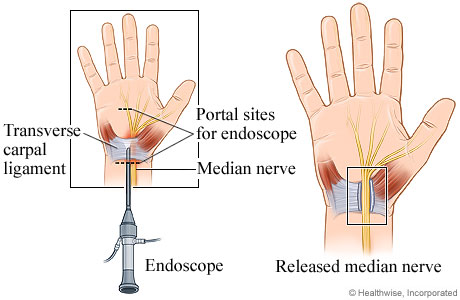Endoscopic Carpal Tunnel Surgery
Surgery Overview
Endoscopic surgery uses a thin tube with a camera attached (endoscope). The endoscope is guided through a small incision in the wrist (single-portal technique) or at the wrist and palm (two-portal technique). The endoscope lets the doctor see structures in the wrist, such as the transverse carpal ligament, without opening the entire area with a large incision.
The cutting tools used in endoscopic surgery are very tiny. They too are inserted through the small incisions in the wrist or wrist and palm. In the single-portal technique, one small tube contains both the camera and a cutting tool.
During endoscopic carpal tunnel release surgery, the transverse carpal ligament is cut. This releases pressure on the median nerve and relieves carpal tunnel syndrome symptoms.
The small incisions in the palm are closed with stitches. Over time, the gap where the ligament was cut will fill with scar tissue.
If you have endoscopic surgery, you probably won't have to stay in the hospital. You can go home on the same day.
How It Is Done

In endoscopic carpal tunnel release surgery, the transverse carpal ligament is cut. This releases the median nerve.
Endoscopic surgery uses a thin tube with a camera attached (endoscope). The endoscope is guided through a small incision in the wrist (single-portal technique) or at the wrist and palm (two-portal technique). The endoscope lets the doctor see structures in the wrist (such as the transverse carpal ligament) without opening the entire area with a large incision.
The cutting tools used in endoscopic surgery are very tiny. They also are inserted through the small incisions in the wrist or wrist and palm. In the single-portal technique, one small tube contains both the camera and a cutting tool.
During endoscopic carpal tunnel release surgery, the transverse carpal ligament is cut. This releases pressure on the median nerve. So the symptoms of carpal tunnel syndrome are relieved.
What To Expect
You can expect a shorter recovery period after endoscopic surgery than after open surgery, because the procedure does not require cutting the palm open and disturbing a large area of the hand.
The pain and numbness may go away right after surgery. Or it may take several months. Try to avoid heavy use of your hand for a couple of weeks.
How soon you can go back to work depends on the type of surgery you had, whether the surgery was on your dominant hand (the hand you use most), and your work activities.
If you had open surgery on your dominant hand and you do repeated actions at work, you may be able to go back to work in 6 to 8 weeks. Repeated motions include typing or assembly-line work. If the surgery was on the other hand and you don't do repeated actions at work, you may be able to go back to work in 7 to 14 days.
If you had endoscopic surgery, you may be able to go back to work sooner than with open surgery.
Why It Is Done
Endoscopic carpal tunnel release surgery is considered when:
- You still have symptoms after a long period of nonsurgical treatment. In general, surgery is not considered until after several weeks to months of nonsurgical treatment. But this assumes that you still have symptoms but there's no sign of nerve damage. Nerve damage would make surgery more urgent.
- Severe symptoms (such as persistent loss of feeling or coordination in the fingers or hand, or no strength in the thumb) restrict your normal daily activities.
- There is damage to the median nerve (shown by nerve test results and loss of hand or finger function) or a risk of damage to the nerve.
A person who is having surgery on both wrists, or who depends on a wheelchair, a walker, or crutches, may choose endoscopic surgery. That's because the healing time can be shorter than with open surgery.
How Well It Works
Most people who have surgery for carpal tunnel syndrome have fewer or no symptoms of pain and numbness in their hand after surgery.footnote 1
In rare cases, the symptoms of pain and numbness may come back. (This is the most common complication.) Or you may have a short-term loss of strength when you pinch or grip an object.
If the thumb muscles have been severely weakened or gotten smaller, your hand strength and function may be limited even after surgery.
Risks
The risk and complication rates for endoscopic surgery are very low. Major problems such as nerve damage happen in fewer than 1 out of 100 surgeries (less than 1%).footnote 2
Possible problems from the surgery include injury to nerves, blood vessels, and tendons. There are also the risks of any type of surgery, including possible infection and risks of general anesthesia. But most endoscopic carpal tunnel surgery is done with local anesthesia or regional block rather than with general anesthesia.
References
Citations
- Li Y, et al. (2020). Open versus endoscopic carpal tunnel release: A systematic review and meta-analysis of randomized controlled trials. BMC Musculoskeletal Disorders, 21(1): 272. DOI: 10.1186/s12891-020-03306-1. Accessed September 20, 2022.
- Vasiliadis HS, et al. (2014). Endoscopic release for carpal tunnel syndrome. Cochrane Database of Systematic Reviews(1): CD008265. DOI: 10.1002/14651858.CD008265.pub2. Accessed September 20, 2022.
Credits
Current as of: July 31, 2024
Author: Ignite Healthwise, LLC Staff
Clinical Review Board
All Healthwise education is reviewed by a team that includes physicians, nurses, advanced practitioners, registered dieticians, and other healthcare professionals.
Current as of: July 31, 2024
Author: Ignite Healthwise, LLC Staff
Clinical Review Board
All Healthwise education is reviewed by a team that includes physicians, nurses, advanced practitioners, registered dieticians, and other healthcare professionals.

